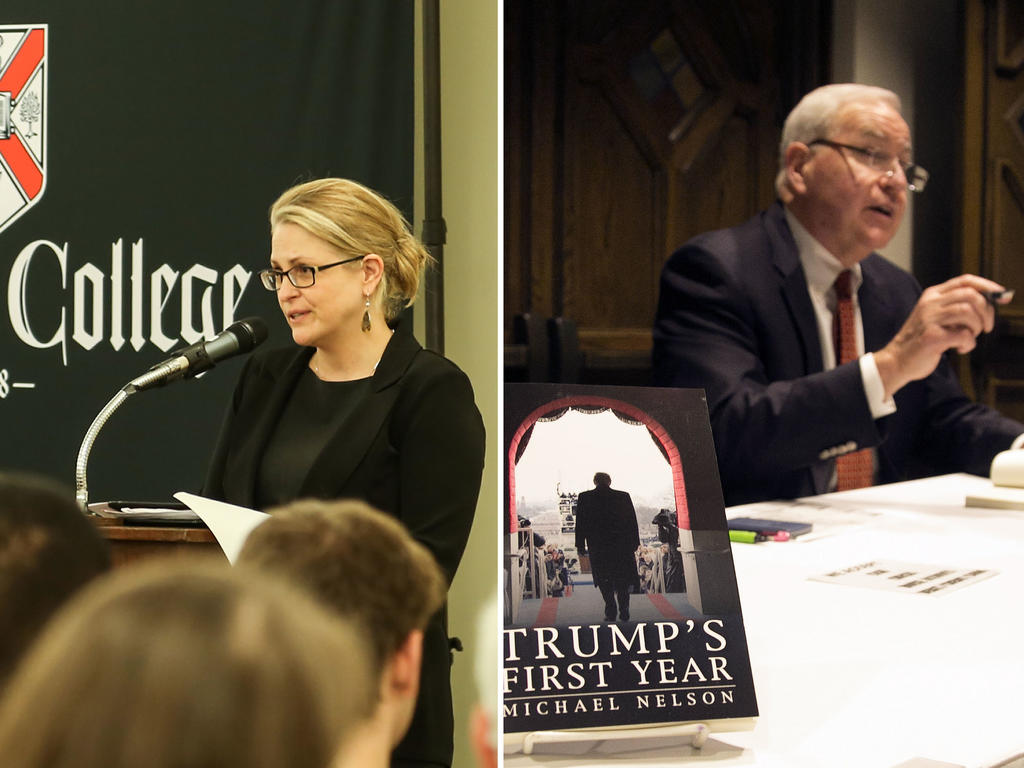With this fall’s midterm elections quickly approaching, some Rhodes students are following day-to-day news coverage, particularly of Tennessee’s Senate and Governor’s races, in their political science courses. One of those courses is Campaigns and Elections, taught by Prof. Amy Jasperson.
“We are focusing on the fundamentals of campaigns, the ‘rules and reality’ that shape them, and the factors that influence the choices of voters,” says Jasperson.
One of the factors the course has been focusing on is campaign finance, and so a recent Washington Post report on a federal court ruling that political nonprofits must now name many of their donors was especially timely. “The best discussions occur when students are inspired to bring in articles to class that connect to the course topic or readings,” she says.
“Every day brings a new event or topic that can inform class discussion in some way,” Jasperson adds. “For example, students can read academic studies about district demographics or voter attitudes in various states, but when a news story breaks that focuses on these concepts in the context of an unfolding campaign, this gives students the opportunity to consider how these factors are discussed in real time in the news, how various political actors react, and how they may think about these ideas as a result.”
Students in the class also must choose a competitive midterm campaign (House, Senate, or Governor’s race) that they will be analyzing over the course of the semester. They will research a range of characteristics about their campaign, including the background context; fundraising and spending by candidates, parties, and outside groups; campaign messages; advertising and media; mobilization efforts; and ultimately, vote choice. They will follow aspects of the Tennessee Senate race together as a class.
Several students in Jasperson’s class attended the ideas forum held at Rhodes Sept. 13 by former Gov. Phil Bredesen, who is the Democratic nominee for the open U.S. Senate seat in Tennessee. “Bredesen’s town hall provides a first-hand account of strategic messaging by a Democrat in a red state, where he is not necessarily campaigning against President Trump, but appealing to the middle and his past supporters, who might be moderate Republicans and Trump supporters,” Jasperson says.
Another political science professor, Michael Nelson, is teaching Southern Politics, which covers politics at the state level as well as the place of the South in the national political arena. “The great thing about political science is that we’re studying topics that evolve even as we study them,” says Nelson.
Students in his course will be required to write an analytical paper on a competitive 2018 election in a Southern state. “Working on this project is almost like riding a rollercoaster, up and down. One day you wake up to find a candidate has gone up in the polls, and then the next day they are down,” says John Mark Stodola ’19, who is in Nelson’s course. “It’s the type of project you need to put a lot of time and attention to, but not for one second is it ever boring.”
In addition to placing an emphasis on the midterm elections in their classes, Rhodes professors also conduct research and provide political commentary in the media. Nelson, for example, is the political analyst for WMC-TV and a contributing editor and columnist for The Daily Memphian. He also is author of numerous articles in national publications and books on the American Presidency.
Jasperson has discussed the role of debates in campaigns in The Commercial Appeal and has provided commentary about past campaigns for The Atlantic, The Philadephia Inquirer, The Toronto Star, CBS radio, and GMTV in the United Kingdom. She currently is working with senior Sophie Bradford on a research project to provide an analysis of the Tennessee Senate race.
“Our research is focused on how both Democrat Phil Bredesen and Republican Marsha Blackburn use television and online advertising in their campaigns,” says Bradford. “Currently my role is to review television and Google advertisements to see when and where certain ads air within the state, and who is responsible for them. This includes ads by the candidate and by outside interest groups invested in the outcome of the election.”
